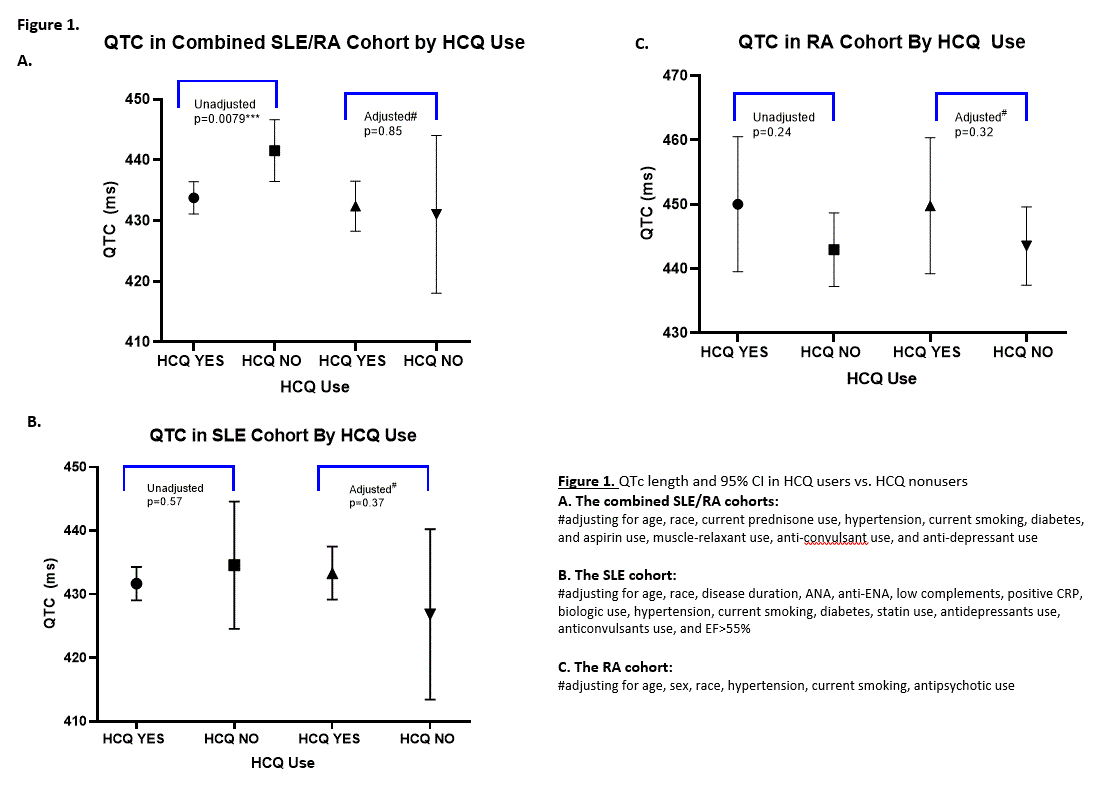Session Information
Date: Friday, November 6, 2020
Session Type: Plenary Session
Session Time: 11:30AM-1:00PM
Background/Purpose: Hydroxychloroquine (HCQ) is a cornerstone therapy for systemic lupus erythematosus (SLE), and is used as monotherapy and combined with other DMARDs in rheumatoid arthritis (RA). However, its use in the treatment of COVID-19 has raised concerns for the possibility of QTc prolongation and development of arrhythmia. We therefore assessed QTc length in a large SLE and RA cohort and its association with HCQ use.
Methods: A total of 681 SLE and RA patients without clinical cardiovascular disease (CVD) were analyzed from two prospective RA cohorts with EKGs as part of study data collection (n=307), and one retrospective SLE cohort (n=374) with EKGs performed as part of standard of care. The participants from all three cohorts were recruited from tertiary referral centers. The association between QTc length and HCQ use was explored in regression models and adjusted for disease-specific characteristics and CVD risk factors.
Results: Of the entire (SLE+RA) cohort, 54% were HCQ users and 44% had a QTc > 440 ms. The mean QTc length was 437± 28 ms. In the entire cohort, adjusted QTc length in HCQ users was comparable to that of non-HCQ users (Figure 1). In multivariate logistic modeling, HCQ use was not a significant predictor of prolonged QTc > 440 or >500 ms for the entire cohort (OR 0.89; CI 0.25-3.2, & OR 0.11; CI 0.007-1.7, respectively), nor for the RA cohort (OR 1.1; CI 0.54-2.2, & OR 0.80; CI 0.23-2.8, respectively). HCQ use was not a significant predictor of a QTc >440 ms in the SLE subset (OR 2.0; CI 0.46-8.8). However, 9/11 SLE patients with a QTc >500 ms were on HCQ, yet these observations were too small to detect statistically significant differences between the HCQ groups. Importantly, QTc >500 ms was not associated with arrhythmias or deaths. No significant interactions were found between HCQ use and other QTc prolonging medications in the entire cohort. In fact, use of HCQ combined with any QTc prolonging medication was associated with a comparable QTc length (434 ms; CI 430-439) vs. use of HCQ alone (433 ms; CI 429-437). A significant interaction (p=0.014) was found between HCQ use and antipsychotic use in the SLE cohort, with QTc length being longer (441 ms; CI 428-454) for those on both vs. those only on HCQ (432 ms; CI 428-436).
Conclusion: This study demonstrates that in a large combined cohort of SLE and RA patients, QTc length does not significantly differ in HCQ users compared with non-HCQ users even while adjusting for potential clinical confounders. Importantly, HCQ use was not associated with a prolonged QTc ( >440 ms) in the combined and individual SLE and RA cohorts, nor was HCQ use a significant predictor of QTc length.
To cite this abstract in AMA style:
Park E, Giles J, Perez-Recio T, Pina P, Depender C, Bathon J, Geraldino-Pardilla L. Hydroxychloroquine Use Was Not Associated with QTc Length in a Large Cohort of SLE and RA Patients [abstract]. Arthritis Rheumatol. 2020; 72 (suppl 10). https://acrabstracts.org/abstract/hydroxychloroquine-use-was-not-associated-with-qtc-length-in-a-large-cohort-of-sle-and-ra-patients/. Accessed .« Back to ACR Convergence 2020
ACR Meeting Abstracts - https://acrabstracts.org/abstract/hydroxychloroquine-use-was-not-associated-with-qtc-length-in-a-large-cohort-of-sle-and-ra-patients/

